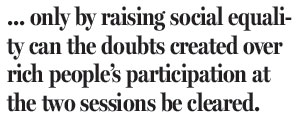The rich have a role at two sessions
By Gao Zhikai (China Daily) Updated: 2015-03-13 10:24
Township and county-level deputies are elected directly, while those at the prefecture, provincial and national levels are elected by lower-level deputies. Besides, deputies are subject to supervision by voters in their electoral districts or units that elect them. This entire process should be strictly supervised, as should the process of how the NPC deputies and CPPCC members fulfill their political responsibilities so as to avoid corruption - for example, use of money to "buy" a representative's post. This is important because such corruption could cause many social problems.
People are paying greater attention to rich people becoming NPC deputies and CPPCC National Committee members also because society today attaches increasing importance to wealth. People should therefore hold an objective and rational view of wealth, without overemphasizing its importance. Whether an NPC deputy or a CPPCC National Committee member is qualified for the post should be judged by his performance at the two sessions rather than his/her wealth.
In the 1980s, Deng Xiaoping, the architect of China's reform and opening-up said: "Let some people get rich first and (help) more get rich." Deng's policy continues to yield results.
In his Government Work Report last week, Premier Li Keqiang said the per capita disposable personal income increased 8 percent in 2014 after deducting price factors, faster than the country's GDP growth, and 12.3 million people in rural areas were lifted out of poverty.
But the Gini coefficient, a key indicator of wealth inequality, was 0.469 in 2014. This calls for China to accelerate income distribution reform to narrow the wealth gap, because only by raising social equality can the doubts created over rich people's participation at the two sessions be cleared.
The author, an English interpreter for Deng Xiaoping in the 1980s, is Chairman of China Energy Security Institute. The article is an excerpt from his interview with China Daily's Zhou Wa.

I’ve lived in China for quite a considerable time including my graduate school years, travelled and worked in a few cities and still choose my destination taking into consideration the density of smog or PM2.5 particulate matter in the region.











